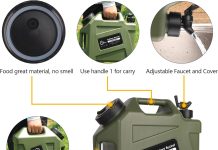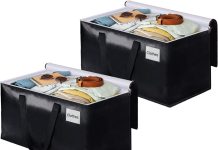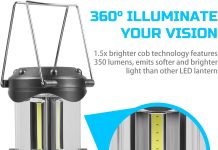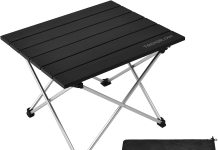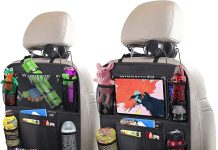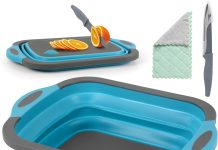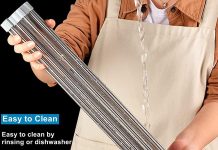Are you ready to take your outdoor cooking skills to the next level? Look no further than camp cookware! Whether you’re a seasoned camper or just starting out, having the right pots, pans, and utensils can make all the difference in preparing delicious meals while enjoying nature. From lightweight and compact options for backpacking trips to durable and versatile sets for car camping adventures, camp cookware comes in a variety of styles and materials to suit your needs. So, grab your apron and get ready to elevate your camping cuisine with the help of these essential kitchen tools!
Review contents
Choosing the Right Camp Cookware
When it comes to camping, having the right cookware is essential for preparing delicious meals in the great outdoors. Whether you’re a seasoned camper or a novice adventurer, it’s important to consider several factors when choosing your camp cookware. In this article, we will guide you through the process of selecting the perfect camp pots, pans, and utensils that will best suit your needs and enhance your camping experience.
Consider the Size and Weight
One of the first things to consider when choosing camp cookware is the size and weight. As campers, we want our gear to be as lightweight and compact as possible, as we often have limited space in our backpacks or camping vehicles. Opting for cookware that is lightweight and compact will make it easier to transport and carry during your camping trips.
Look for Durability
Durability is another crucial factor to consider when selecting your camp cookware. We want our cookware to withstand the rigors of outdoor use, including campfire cooking and exposure to the elements. Look for sturdy materials and construction that can withstand high heat and rough handling. Investing in durable cookware may cost a bit more initially, but it will save you money in the long run by lasting for many camping seasons.
Consider the Material
The material of your camp cookware plays a significant role in its functionality and performance. There are different materials available, each with its own set of advantages and drawbacks. Some common materials used for camp cookware include stainless steel, aluminum, titanium, and cast iron.
Stainless steel is popular due to its durability and corrosion-resistant properties. It is a reliable choice for campers who want long-lasting cookware that can handle rugged outdoor conditions. Aluminum is lightweight and heats up quickly, making it suitable for fast and even cooking. However, it may not be as durable as stainless steel.
Titanium is known for its lightweight yet sturdy nature, making it an excellent choice for backpackers seeking to minimize weight. Cast iron is renowned for its excellent heat retention, making it ideal for campfire cooking. However, cast iron is typically heavier and requires proper maintenance to prevent rust.
Check for Compatibility
Another essential factor to consider when selecting camp cookware is compatibility. Ensure that your pots, pans, and utensils are compatible with your camping stove, campfire, or any other heat source you plan to use. Some cookware is specifically designed for campfire cooking, while others are better suited for stove cooking. Checking for compatibility will ensure that your camp cookware performs optimally and provides you with hassle-free cooking experiences.
Essential Camp Cookware Items
To have a fully functional outdoor kitchen, there are three essential camp cookware items you should consider bringing on your camping trips: camp pots, camp pans, and utensils. These items will cover all your cooking needs while allowing you to prepare a wide variety of meals in the wilderness.
Camp Pots
Camp pots are versatile kitchen essentials for camping. They can be used for boiling water, cooking soups, stews, pasta, and much more. When choosing a camp pot, consider the following factors:
Size Matters
Make sure to choose a camp pot that suits your cooking needs. If you’re camping with a large group, you’ll want a larger pot to accommodate larger quantities of food. On the other hand, for solo camping or smaller groups, a smaller pot will be more than sufficient. Consider the capacity and dimensions of the pot carefully to ensure it fits your specific requirements.
Material Options
Camp pots are available in various materials, each with its own advantages. Stainless steel pots are durable, easy to clean, and retain heat well. Aluminum pots, on the other hand, are lightweight and heat up quickly. Titanium pots strike a balance between durability and weight, making them a popular choice for backpackers seeking to minimize their load.
Lid and Handles
When selecting a camp pot, look for one with a well-fitting lid to retain heat and allow for efficient cooking. Additionally, ensure that the pot has sturdy handles that are heat-resistant to facilitate easy handling and pouring.
Camp Pans
Camp pans are another essential piece of cookware for outdoor cooking. They are versatile tools that can be used for frying up bacon and eggs, cooking pancakes, sautéing vegetables, and more. Consider the following factors when choosing a camp pan:
Size and Shape
Camp pans come in various sizes and shapes. Consider your cooking style and the number of people you’ll be cooking for. If you enjoy cooking larger meals or are camping with a group, opt for a larger pan. On the other hand, if you prefer lighter, more compact cooking gear or are cooking for yourself or one other person, a smaller pan will suffice.
Material Choices
Similar to camp pots, camp pans are available in various materials. Stainless steel pans are durable, conduct heat evenly, and are easy to clean. Cast iron pans excel at heat retention and can provide excellent searing and browning of food. However, they are heavier and require proper seasoning and maintenance to prevent rust. Non-stick pans coated with materials like Teflon provide easy food release, but they may wear off over time.
Non-Stick Surfaces
Consider whether you prefer a non-stick surface on your camp pan, as this can make cooking and cleaning easier. Non-stick pans can be a great option for campers looking for convenience, but they may not be as durable as pans without this coating.
Utensils
While pots and pans are the stars of your camp cookware, utensils play a vital supporting role. Having the right utensils will make cooking and eating outdoors much more enjoyable. Consider the following utensils for your camp kitchen:
Cutlery
Make sure to pack essential utensils such as forks, knives, and spoons. Opt for lightweight options or consider using multi-purpose utensils to save space. It’s also a good idea to bring a suitable knife for food prep tasks.
Cooking Tools
Bring along a spatula, tongs, and a stirring spoon for handling and stirring food. Consider the materials and ensure they are heat-resistant and suitable for outdoor cooking. Silicone or stainless steel utensils are excellent options.
Cleaning Tools
Keeping your cookware clean is crucial for maintaining hygiene in your camp kitchen. Pack a scrub brush or sponge specifically designed for outdoor use to clean your cookware effectively. Also, don’t forget to bring biodegradable soap for washing your utensils and cookware.
Cooking Methods with Camp Cookware
Camp cookware can be used in different cooking methods, depending on your preferences and the resources available to you. Let’s explore two common methods:
Campfire Cooking
Campfires provide a traditional and charming way to cook in the great outdoors. When cooking over a campfire, choose cookware that can withstand high heat and direct contact with open flames. Cast iron cookware is particularly well-suited for campfire cooking due to its excellent heat retention and durability.
To cook over a campfire, look for cooking grates or tripods that can support your pots and pans above the flames. You can also use a campfire grill if you prefer more direct heat and the ability to grill meats and vegetables. It’s important to practice fire safety and follow any regulations or restrictions in place regarding campfire usage to ensure the safety of yourself and the environment.
Stove Cooking
Using a camping stove offers convenience and consistency in outdoor cooking. Stoves are portable, easy to use, and can provide controlled heat for more precise cooking. When using a stove, look for cookware that is compatible with your particular stove model.
Stove cooking allows for a wide range of cooking techniques, from boiling water to frying or sautéing. It is important to follow the manufacturer’s instructions for your camping stove to ensure safe and efficient cooking. Always use your camp cookware on stable surfaces and never leave an open flame unattended.
Cleaning and Maintenance
Proper cleaning and maintenance of your camp cookware is essential for longevity and hygienic cooking. Follow these tips to keep your cookware in top shape:
Proper Cleaning Techniques
After each use, clean your cookware thoroughly using biodegradable soap and a scrub brush or sponge designed for outdoor use. Avoid using abrasive sponges or steel wool, as they can damage the surface of your cookware. Rinse your cookware well to remove all traces of soap before drying.
Preventing Rust
Rust can be a common issue with certain types of camp cookware, such as cast iron. To prevent rust, make sure to dry your cookware completely after washing. If using cast iron, apply a thin layer of cooking oil to the surface after cleaning to create a protective barrier against moisture.
Storage Tips
When not in use, store your camp cookware in a dry and well-ventilated area. Make sure the cookware is clean and completely dry before storing to prevent the growth of mold or mildew. Consider using storage bags or containers specifically designed for camp cookware to keep everything organized and protected.
Tips for Cooking with Camp Cookware
Cooking outdoors with camp cookware can be a delightful experience, but it does come with its own set of challenges. Here are some tips to help you make the most of your outdoor cooking adventures:
Bring the Right Ingredients
Plan your meals ahead of time and bring ingredients that are suitable for outdoor cooking. It’s a good idea to pre-pack ingredients in sealable bags or containers to minimize waste and make cooking more convenient.
Prepare and Pre-Cut Ahead of Time
To save time and effort while camping, consider pre-cutting vegetables and marinating meats before you leave. This will make cooking at the campsite much more efficient and enjoyable.
Use Proper Heat Control
Outdoor cooking can be less predictable than cooking on a home stove. Properly regulating the heat is crucial to prevent burning or undercooking food. Familiarize yourself with your camp stove or campfire setup to understand how to adjust heat levels effectively.
Cooking with Limited Resources
When camping, you may have limited resources, so it’s essential to adapt and be creative with your cooking. Consider using one-pot meals or foil pack cooking, where you can cook multiple ingredients together to save space and minimize the number of utensils required.
Safety Considerations
While enjoying outdoor cooking with your camp cookware, it’s important to prioritize safety. Here are some safety considerations to keep in mind:
Fire Safety
When cooking with open flames, always exercise caution and follow fire safety guidelines. Keep flammable objects away from the cooking area and never leave a campfire unattended. Have a fire extinguisher or water source nearby in case of emergencies.
Food Handling Safety
Follow proper food handling practices to prevent foodborne illnesses. Keep perishable foods refrigerated until ready to cook, and always wash your hands and utensils before handling food. Cook food to the recommended internal temperatures to ensure it is safe to eat.
Proper Handling of Hot Cookware
Camp cookware can become extremely hot during cooking. Always use oven mitts or heat-resistant gloves when handling hot pots, pans, or utensils. Be cautious of spills or splatters that can cause burns.
Conclusion
Choosing the right camp cookware is crucial for a successful and enjoyable camping experience. Consider factors such as size and weight, durability, material, and compatibility when selecting your camp pots, pans, and utensils. With the right cookware, you’ll be well-equipped to prepare delicious meals in the great outdoors. Remember to follow proper cleaning and maintenance practices, and always prioritize safety when cooking with camp cookware. So go ahead, gather around the campfire or fire up your camping stove, and embark on a culinary adventure in the wilderness with confidence! Happy camping and happy cooking!





